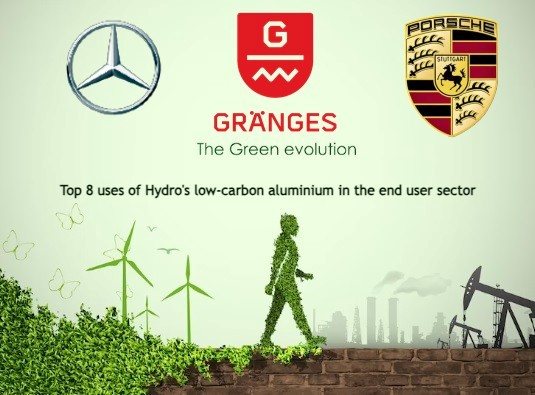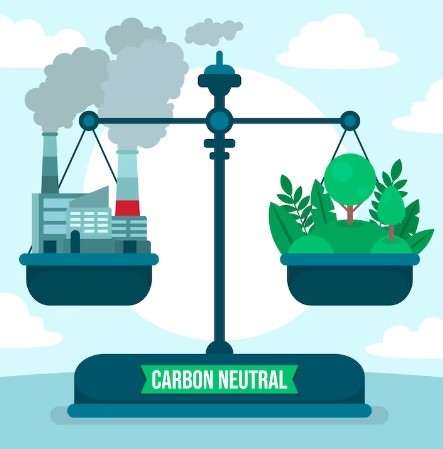

Norwegian aluminium giant, Hydro is recognized as one of the world's leading producers of low-carbon aluminium. Aluminium manufacturing is notorious for its high energy consumption and greenhouse gas emissions; however, Hydro has been actively working to minimize the environmental impact of its operations.

To achieve low-carbon aluminium production, Hydro employs various strategies and technologies. The company aims to power its aluminium production with renewable energy sources, primarily hydropower, which is a clean and renewable energy source. This approach reduces carbon emissions linked to electricity consumption. Hydro is also actively exploring and investing in carbon capture and storage technologies. This technology involves capturing carbon dioxide emissions from industrial processes and storing them underground, preventing their release into the atmosphere. Implementing CCS can help Hydro further reduce its carbon emissions.
Hydro’s low-carbon aluminium: CIRCAL 100R; properties are discussed below:
Compared to Hydro CIRCAL extrusion ingot, which uses 75% post-consumer aluminium scrap and emits 2.3 kg CO2 per kg aluminium, this is a significant improvement. Another variant of low-carbon aluminium from Hydro that is quite famous in the manufacturing sector is REDUX.
To implement this eco-conscious practice of low-carbon aluminium integration, Hydro has started collaborating with various established brands to curtail industry-wide carbon emissions in the long run.
Some of the big names who have associated themselves with Hydro for their products are:
Mercedes Benz and Hydro: It took almost one year for Hydro to collaborate with Mercedes after the production of their first batch of CIRCAL 100R. In May 2023, Mercedes-Benz shared the results of their low-carbon technology roadmap, developed in partnership with aluminium producer Hydro. They successfully tested eco-friendly aluminium, which contains a minimum of 25% post-consumer scrap. This sustainable material will be used in their structural cast components for production this year. The tested aluminium has a carbon footprint of only 2.8 kg CO2 per kg of aluminium.
Porsche and Hydro: Porsche AG and Norsk Hydro ASA are teaming up to reduce the carbon footprint of Porsche's car models. They will be using Hydro's low-carbon aluminium and extrusions, which will help Porsche decrease the amount of CO2 emitted by their vehicles. By 2025, Porsche plans to reduce the footprint of aluminium in their cars by approximately 3.5 kilograms of CO2 per kilogram of aluminium. This is a significant reduction of around 60% compared to Europe's current primary aluminium consumption.
Gränges and Hydro: Gränges, a company that specializes in developing lightweight and sustainable aluminium products, has teamed up with Hydro, a Norwegian aluminium giant, to provide low-carbon and circular aluminium options to the automotive industry. Under this new partnership, Gränges will procure low-carbon primary aluminium from Hydro. This move is a critical step in Gränges' plan to minimize the carbon footprint of the metals it sources. Customers of Gränges prioritize the use of eco-friendly materials and aim to reduce their carbon footprint and emissions during both the production and usage phases of the value chain.

Saint-Gobain Glass and Hydro: Hydro Building Systems and Saint-Gobain Glass are collaborating to reduce the carbon footprint of building facades by 50% through the use of innovative low-carbon solutions. They are utilizing unique technologies to create products with decreasing levels of embodied carbon. Hydro Building Systems is using Hydro CIRCAL, a high proportion of recycled post-consumer waste material, in its aluminium facade solutions. Meanwhile, Saint-Gobain Glass produces low-carbon glass products made using renewable energy sources and a significant amount of recycled material.
Velux and Hydro: VELUX has partnered with Hydro to reduce carbon emissions in their aluminium value chain, particularly in the extruded aluminium components Hydro supplies to Velux. This partnership aims to achieve emissions below 2.0 kg per kilogram of aluminium by 2030. With the use of Hydro REDUXA and Hydro CIRCAL, Velux plans to reduce nearly 15,000-20,000 tonnes of carbon from its aluminium profiles by the end of 2022.
House of Choice by Hydro: In Sweden, Hydro bagged a multimillion-dollar project called the House of Choice around 2021. Hydro's low-carbon aluminium CIRCAL was used for the construction of the project, which is Scandinavia's first zero-energy hotel. Hydro's glazed SAPA 4150 façade and insulated 50mm-wide aluminium profiles SAPA 5050 were also used in the construction.
CAKE, Vattenfall, and Hydro: Hydro, CAKE, and Vattenfall are collaborating on the "Cleanest Dirt Bike Ever" project to reduce the auto industry's carbon footprint. CAKE and Vattenfall aim to eliminate carbon emissions from the electric CAKE Kalk OR motorcycle production by 2025. Hydro will provide low-carbon aluminium and EcoDesign expertise to help adapt the bike to new aluminium alloys.
Brompton and Hydro: Brompton, a maker of folding bikes, has made a promise to reduce the carbon footprint of its products. They are currently exploring the potential of using low-carbon and post-consumer recycled aluminium from Hydro, a Norwegian aluminium company known for producing high-quality materials with minimal CO2 emissions. Both Brompton and Hydro are dedicated to achieving net-zero emissions by 2050 and are looking to incorporate more aluminium into their signature bike models. This partnership aims to lead the way in reducing emissions from bike production and promoting end-of-life recycling.
Hydro focuses on responsible sourcing of raw materials, including bauxite, which is the primary source of aluminium. By ensuring sustainable and ethical sourcing practices, Hydro promotes responsible environmental management throughout the entire aluminium value chain. Hydro's commitment to low-carbon aluminium production aligns with global sustainability goals, such as reducing greenhouse gas emissions and combating climate change. By integrating renewable energy, energy efficiency measures, recycling, and exploring carbon capture technologies, Hydro aims to produce aluminium with a significantly lower environmental impact.
Responses








